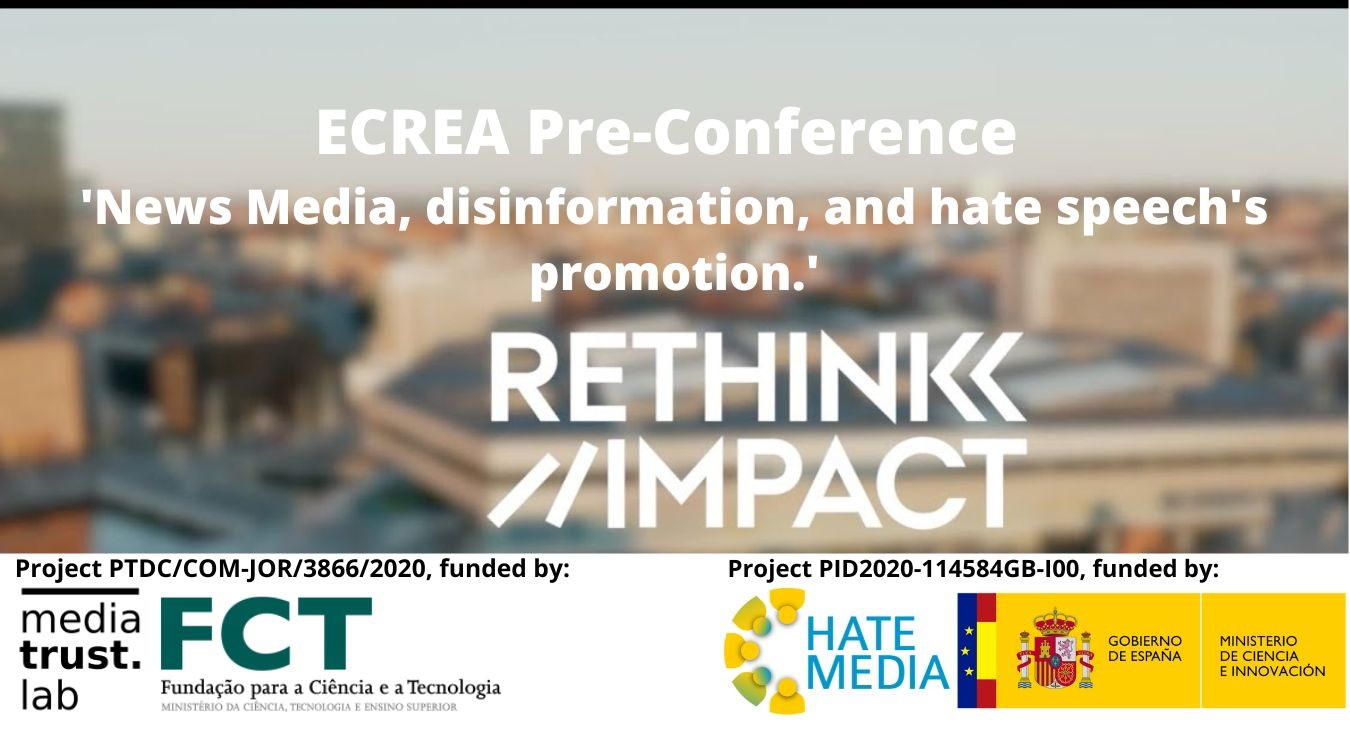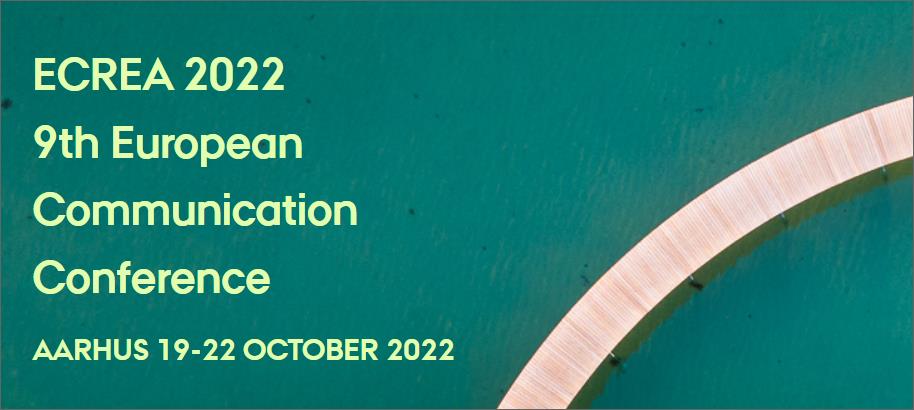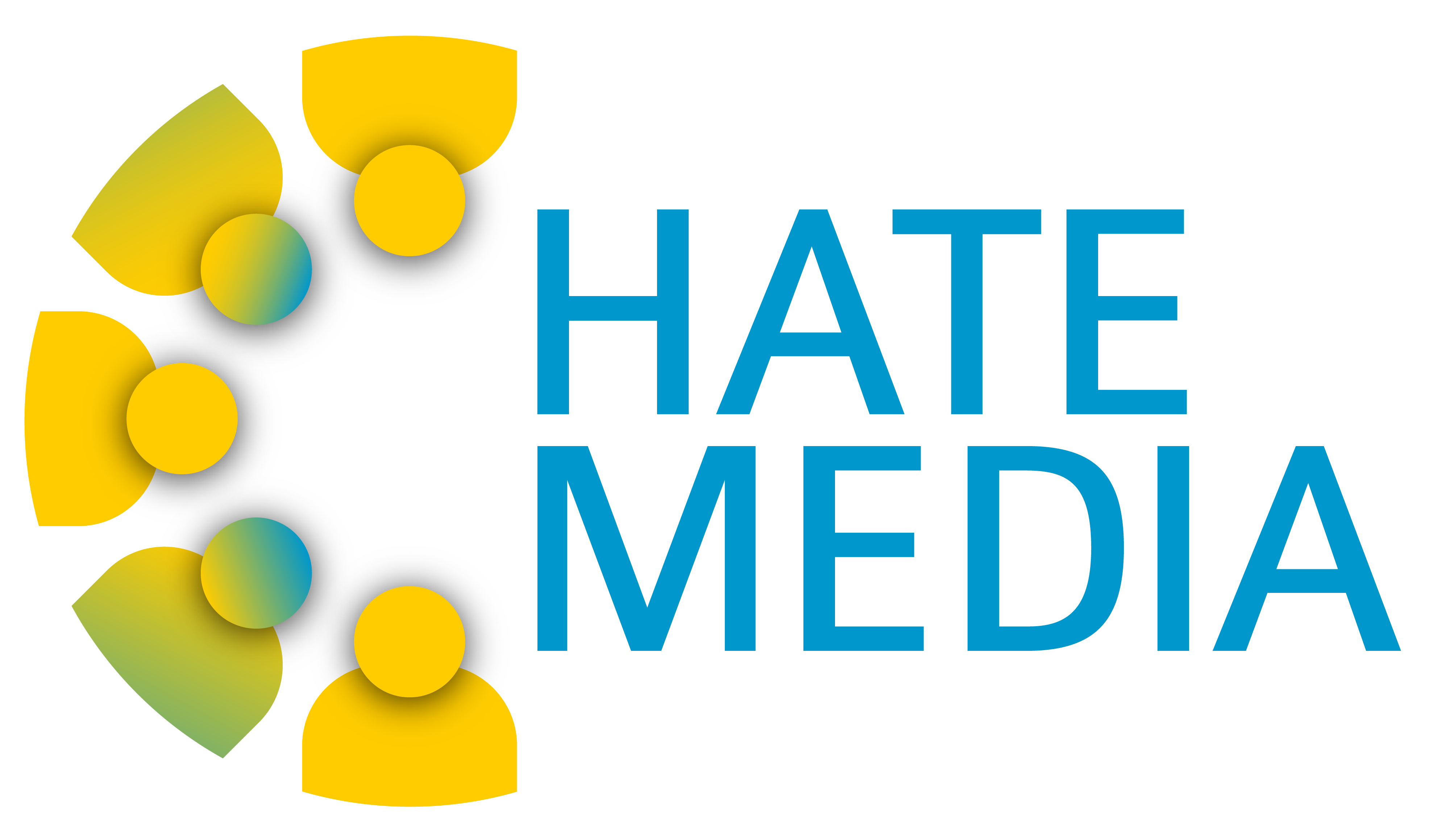News Media, disinformation, and hate speech’s promotion

Pre-conference Presentation
News Media, disinformation, and hate speech’s promotion
This online pre-conference is sponsored by:
Hatemedia’s Project (PID2020-114584GB-I00), funded by the Spanish Ministry of Science and Innovation
MediaTrust.Lab Project (PTDC/COM-JOR/3866/2020), funded by the Portuguese Foundation for Science and Technology
Freedom of speech in democratic societies is critical in guaranteeing and protecting civil and political rights. However, the overwhelming presence and intensity of information in digital settings and its prominence, especially on social networks, do not necessarily encourage democratic principles and debate. Indeed, it can provoke the opposite effect, as the anonymity and immediacy of a lot of content (fake news, emotional approaches) introduce elements that hinder forms of debate based on an analysis of the issues. All of this leads to liquid modernity, where the growing proliferation of content (disinformation or other) hinders coexistence based on democratic values because of the dissemination of hateful messages or those that foster intolerance and incitement directed at certain easily identifiable groups (e.g., migrants, LGTBI community, groups of specific religious movements).
The current digital ecosystem has seen the most effective communication strategies become varied among a more significant number of citizens (users). They increase the weight of messages that appeal to emotions, disseminate personal beliefs and undermine objective or truthful facts about specific topics. This is done to attract a more significant number of audiences (which are increasingly closed-off) in the various digital communication spaces.
As the borders in digital settings are becoming blurred between the production of news and non-news content, a communication context has arisen that is increasingly prone to exacerbating fears of the foreign (the different) in public opinion. This fosters the viral spreading of hate speech toward groups easily defined by their religious beliefs or ethnic and cultural origins, hindering social cohesion, peaceful coexistence, and political stability in democratic states.
Strategies for disseminating disinformation (e.g., Astroturfing) used in politics, public relations, and advertising take advantage of the recurring self-positioning of these “apparently anonymous” users as outsiders and anti-system to legitimize the existence of a “disinformation culture” that favors the polarization of public opinion and hate speech directed against specific groups. This is done to lay the foundations for certain (ideologically extremist or populist) belief systems associated with social and political groups starting from digital environments.
All of this hinders the development of democratic values and freedom of expression. It also promotes a scenario that undermines the role of the Gatekeeper of the mainstream media under the increasing prominence of social networks and the hybrid communication system they create. This combination of factors fosters the dissemination of unfounded content that promulgates negative expressions, prejudices, and stereotypes even though there is no shortage of verified information.
The transformation of the digital ecosystem has lessened the influence of professional and general media on citizens-users enclosed in digital communication spaces dominated by narrative strategies based on personal feelings and beliefs. This decisively influences the construction of public opinion, individually and collectively, and facilitates the normalization of hate speech and the coexistence with disinformation content. However, also contribute to re-think the role of news media as Gatekeeper and the need to debate about new ways to understand and monitor the spreading of this kind of content.
This pre-conference looks at how disinformation and hate speech spread in public opinion from different perspectives, not only focusing on understanding how to disseminate and affect general populations; but also to discern about the role assumed by fact-checkers, journalists, and news media during the widening recognition of this kind of content at local and national level; and recognize different approach (theoretical and methodological) that help to understand and identify mechanisms and practices that help monitor and control the use of disinformation and hate speech from and through social media and digital news media.
The contributions to this pre-conference, from different national and international contexts, can focus (among others) on the following topics:
- Identifying journalists’ biases and frames influence their perception of certain phenomena and groups and preparing news about them.
- Identifying methods that help to detect hate speech and disinformation content through digital and news media;
- Identifying fact-checkers and projects initiative for detecting hate speech and disinformation content;
- Understanding how hate speech and disinformation content are built and spread in the media;
- Understanding practices and routines of journalists who disseminate or help combat the exposure of hate speech and disinformation content in public opinion;
- Studying roles and stereotypes disseminated through the news that underpin hateful attitudes towards certain groups;
- Identifying the weaknesses of the media industry and the management of content about hate speech and disinformation content on a massive scale;
- Identifying successful monitoring and controlling strategies in the media to combat hate speech.
- Understanding the narrative structure of hate speech and disinformation content on social media and digital news media.
- Understanding how and the role assumed by local media and journalism around the spreading of hate speech and disinformation content on internet.
ECREA 2022
9th European Communication
Conference
AARHUS 19-22 OCTOBER 2022

Registration
The event is entirely free to access. You only have to register by entering the link in the button below to have access to the means of viewing the debate raised in this pre-conference.
NOTE: Certificates will only be issued to registered before this event takes place.
Final Program
| Hours | Title | Full name | Institutions |
| 10:00-10:30 hours | Presentation by coordinators | ||
| 10:30-10:55 hours | From citizen-led to business projects: the diversity of the fact-checking sphere in Portugal.
| Sílvio Santos | University of Coimbra (Portugal). |
| 10:55-11:20 hours | Studying hate and disinformation in different contexts: A textual analysis approach
| Susana Salgado; Pedro Alcântara da Silva; Homero Gil Zuniga; Tatiana Dourado; Miguel Coimbra; Alexandre Francisco; Bruno Martins; Sérgio Nunes | University of Lisbon – Instituto de Ciências Sociais and Instituto de Engenharia de Sistemas e Computadores: Investigação e Desenvolvimento (Portugal), University of Salamanca (Spain), Getulio Vargas Foundation (Brazil), and University of Porto – Faculty of Engineering, (Portugal). |
| 11:20-11:35 hours | A&Q | ||
| 11:35-12:00 hours | Bringing local disinformation into the discussion: a contribution from Portugal.
| Pedro Jerónimo | Beira Interior University (Portugal). |
| 12:00-12:25 hours | A longitudinal approach to fact-checkers: Analyzing the evolution of layouts and contents
| Jon Sedano | University of Malaga (Spain) |
| 12:25-12:50 hours | Astroturfing, the technique of disseminating disinformation campaigns on social networks
| Sergio Arce-García | International University of La Rioja (Spain) |
| 12:50-13:05 hours | A&Q | ||
| 13:05-13:30 hours | How disinformation is transforming public relations industry: Black&Dark PR | Leticia Rodríguez- Fernández | University of Cádiz |
| 13:30-13:55 hours | Political actors and promotion of disinformation content in Spain. Twitter Case
| Marta Sánchez-Esparza; Adoracion Merino-Arriba | Rey Juan Carlos University (Spain), and Internacional University of La Rioja (Spain). |
| 13:55-14:20 hours | Hate Speech’s taxonomy in Spanish professional news media | Tamara Antona; Elias Said-Hung; Julio Montero | International University of La Rioja (Spain) |
| 14:20-14:35 hours | A&Q | ||
| 14:35-14:50 hours | Approach to the concept and identification of hate in digital media in Spain
| Max Römer, Alberto De Luca, Damaso Izquierdo | Camilo José Cela University (Spain), International University of La Rioja (Spain), and Navarra University (Spain). |
| 14:50-15:15 hours | The narrative structure of hate speech on Social Networks
| Orlando París | University for Foreigners of Siena (Italy) |
| 15:15-15:35 hours | A research on the characteristics of the hate speech among youngsters in Europe
| Roberto Moreno- López; César Arroyo- López | Castilla-La Mancha University, and Institute for International Studies in Education and Society – INEEYS. |
| 15:35-15:50 hours | A&Q | ||
| 15:50-16:00 hours | Closure of pre-conference by coordinators | ||
To see the summaries of each topic addressed in the selected papers, access to Themes and abstracts.
Download this program here.
Live broadcast: YouTube, Linkedin, Facebook and Twitter channel Hatemedia project

